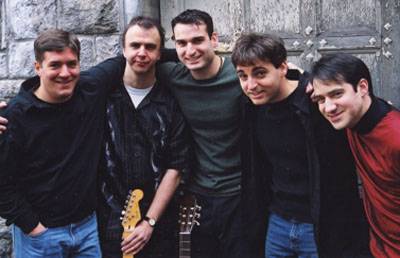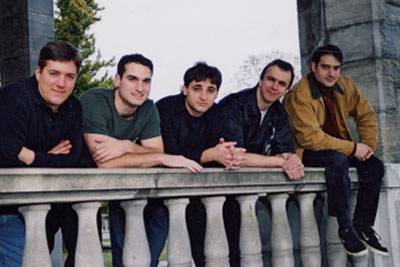Interview

(Progressive Newsletter Nr.41 09/02)
excerpts from an interview with Tom (Vocals, Keyboards, Guitar) and John Galgano (Bass, Guitar)
John: Well, we worked hard getting the IZZ name out there with live shows in and around the New York City area while supporting our debut CD, “Sliver of a Sun”. We also went through a personnel change in the band. Phil left the band and Brems came in. However, there was hardly an adjustment to be made because Brems had been recording and writing with us all the while. In fact, Brems plays guitar on some of the “Sliver of a Sun” tracks. Anyway, it was this lineup that wrote the songs for what would eventually become “I Move”
Tom: We actually were recording non-stop. Altogether we wrote and recorded about two hours worth of music; some of which had to do with the conceptual nature of “I Move” and some of which did not. We decided to temporarily put these other tracks on hold for future releases. We actually had contemplated putting out a double CD, but we decided to stick with just the concept material for “I Move”. Between the line-up change, gigging, and heavy recording we, in fact, were quite busy over the last three years.
For that the 14 tracks of "I move" are connected as a more or less continous piece of music, here comes the obvious question: is it therefore a concept album or did you choose this way of connecting the pieces together to give the album a more natural flow?
Tom: Both. First of all, it is a concept album. Concept albums lend themselves to be a continuous piece. By linking the songs you create a continuous thought process which any story needs. What we’re most happy about is the concept naturally presented itself to us; we did not seek it out. We certainly did not have some big thinking session about what the concept of our next album could be about. Halfway through the recording process we realized that a concept was being born so we went with it.
John: Yet, we intended that each song should be able to stand alone and be enjoyed independently of the concept. Part of the great things about concept albums is each listener can bring their own meaning to the concept.

Is there something like a center-piece or a favourite track on the album?
John: You can probably identify the centerpiece as “Coming Like Light”. In that song, all of the themes, musically and lyrically from the album come together. Although, the song “Believe” also plays an important role in that it lyrically brings about the character’s realization. You can ask me everyday what my favorite track is and everyday I’d give you a different answer. Today, I’ll say that my favorite track is “I Move”. It just really grooves for me.
How important are the lyrics for you and when composing a song what comes first: the music or the lyrics?
John: Lyrics are very important to me and to us as a band. The song has to say something musically and lyrically. If you have a great song musically and the lyrics are sort of bland, in my opinion, it detracts from the quality of the song. I am of the opinion that most times lyrics are just as important as the music. For me, sometimes I will be feeling a certain way and just write some lyrics and then try to get some melodies. And other times, I will be plugging away at the guitar or bass or piano and write some musical theme and then try to get lyrics to fit the melodies. So, for me, it works both ways. And then sometimes, like with “Believe” the music and lyrics come at the same time. That’s when you just can’t stop writing…even when it’s 4:00 a.m. in the morning and you want to sleep! The music in your brain won’t let you sleep until you finish the song.
"I move" is in my impression, a major step forward concerning song-writing, album production, forming an own musical identity. How did you manage to improve all these things?
John: First of all, thank you for the kind words. I think it’s a matter of us growing as musicians. I’d like to believe that we will always be improving and I know we will always be striving to make the next album better than the last. I think the addition of Brems on guitar helped to solidify our sound and Tom’s perfectionist mentality and extensive knowledge of production contributed to the sound of the album. Our passion will always be to write and record interesting and creative pieces of music

You also used a more up-to-date, modern, for my ears even fresher sound on your album. Did you try to build a bridge between your obvious progressive rock roots and today's music?
John: Again, I don’t think we consciously said, “Let’s make this album sound more modern”. I think it was just playing with different instruments and Brian experimenting with different drum sounds. And you can’t help but be influenced by the music you listen to and I’ve listened to all different kinds of music over the last few years from Radiohead to Jeff Buckley to Marillion and Yes. Each of us has our own musical tastes and we all bring something different to the table. So that could be one reason why there are so many different sounds on the album. We just try to use the technology that’s available to us without letting it dominate our sound. For me, there’s still no greater sound than an acoustic snare drum. It can’t be replaced by any sound a drum machine makes. So, if there is a modern edge to the album, it comes from our desire to try new things and move forward but still with the musical ideals of the progressive roots.
At the end of March you played a gig with an acoustic set of music of your two CDs. Is the acoustical approach something you'd like to repeat in the future and how did you rearrange your songs that they work in "unplugged" versions?
John: We love to play acoustic gigs. We’ve done a couple in the last few months and it’s just a lot of fun because we get to re-arrange our songs. We’ll take a song like “Razor” and just find a new way to play it. And it helps it to stay fresh for us. Sometimes, I’ll play bass lines on acoustic guitar or I’ll play a little piano. Whatever the song calls for, we’ll do it. But playing acoustically allows us to play the same songs we always play in a new and different way. A song like “Spinnin’ Round” is great fun to play acoustically, because on the CD, it’s obviously a very electric song, so we have a more laid back version of it which brings out other aspects of the song. It loses its “electronic-ness” but ends up sounding great in a different way. Although there’s nothing quite like playing our music at full throttle, I’m sure we will play the acoustic shows in the future.
Kristian Selm © Progressive Newsletter 2002